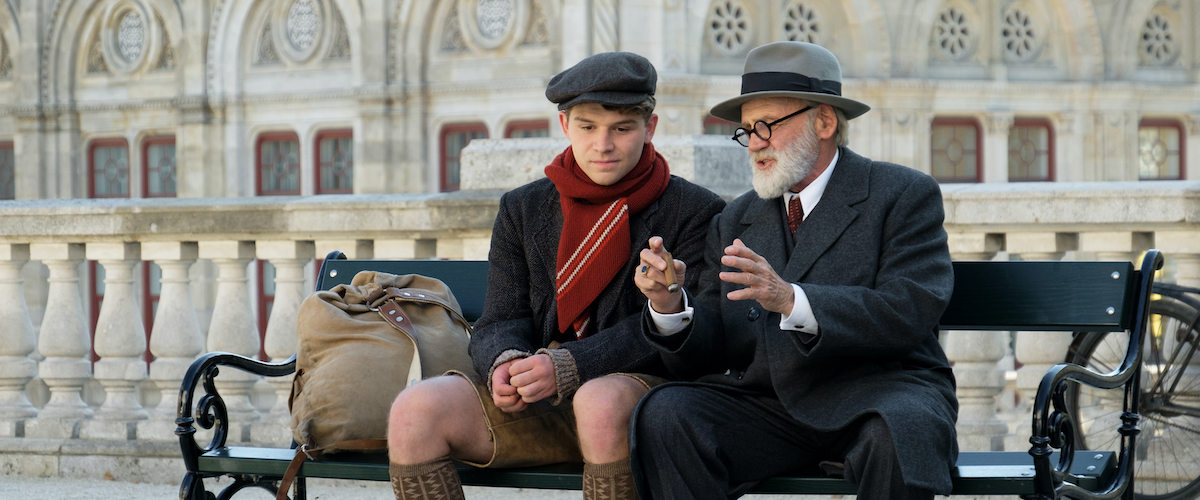TOBACCONIST, THE (DER TRAFIKANT)
(director/writer: Nikolaus Leytner; screenwriters: Klaus Richter/book by Robert Seethaler; cinematographer: Hermann Dunzendorfer; editor: Bettina Mazakarini; music: Matthias Weber; cast: Simon Morzé (Franz Huchel), Bruno Ganz (Prof. Sigmund Freud), Johannes Krisch (Herr Tsrnjek), Emma Drogunova (Anezka), David Altman (Truck driver), Christoph Bittenauer (ahrmarktausrufer), Gerti Drassl (), Karoline Eichhorn (Anna Freud), Michael Fitz (Roter Egon), Regina Fritsch (Margarete Huchel), Tom Hanslmaier (Offizier), Erni Mangold (Frau im Pelzmantel im Bahnhof), Thomas Mraz (Conferencier), Vicky Nikolaevskaja (Freundin), Martin Ofenbauer (Ober im Kaffeehaus); Runtime: 117; MPAA Rating: NR; producers: Dieter Pochiatko, Jakob Pochiatko, Ralf Zimmerman; Menemsha Films; 2018-Germany/Austria-in German and some Czech, with English subtitles)
“I enjoyed watching Ganz perform more than I did the film.”
Reviewed by Dennis Schwartz
TV filmmaker Nikolaus Leytner (“Lemming’s First Case”) directs and co-writes with Klaus Richter this middle-brow art-house film. It’s a forced parable that plays out as a coming-of-age story of the naive 17-year-old Franz (Simon Morzé), a country boy, who goes to the city to work in a tobacco shop. It’s adapted from the popular 2012 novel by Robert Seethaler. It takes place in the late-1930s in Vienna, during the Nazi occupation.
Franz is sent by his mother after a family tragedy to live and work with the liberal-minded tobacconist, Otto (Johannes Krisch). One of his customers is the elderly Jewish founder of psychoanalysis, Sigmund Freud (Bruno Ganz, in one of his last roles before his death). Freud befriends the naive gentile kid, who is preoccupied with thoughts of getting laid. Freud gently talks to him about his girl problems. This happens just as the Germans occupy Vienna, during the Anschluss of 1938. Because of the Nazi threats against Jews, Freud leaves his comfortable Vienna home and escapes to London. He will die a year later.
Freud is depicted as a benevolent old man with a hankering for sex talk and asking questions, who freely talks to the kid and encourages him to get over his shyness around girls.
The handsome kid is a dreamer, who fantasizes he’s back home at Lake Atter getting some tail. The film goes their repeatedly in blue and grey imagery, cutting away to rewind rather than show any sexual acts during his fantasies. This filmmaking device was a negative and took away any of the film’s spontaneity it might have wanted.
When the kid meets at a local street fair the more experienced Anezka (Emma Drogunova), an attractive gap-toothed Bohemian girl who speaks a choppy German, she vanishes after exciting him by kissing him on the cheek. Freud discards the couch, as he for most of the film tries to work his magic on the kid and see if he can bring the kid together with the girl of his dreams.
Though the film has its limitations, it’s effective in telling us about the lives of the ordinary Viennese people during these turbulent times of occupation who are not Nazis. It also shows how the kid comes to realize he must take a stand against these haters when the cigar store owner is called “A Jew Lover” and his store is attacked.
The open-ended fictional interactions between the naive kid and the sophisticated famous cigar smoking intellectual, who is run out of his hometown by the evil anti-Semites now in control of the once illustrious capital city, is amusing and cute but hardly deep.
I enjoyed watching Ganz perform more than I did the film. In an earlier film he plays the madman Hitler while in this one plays the kindly Freud, and is effective in both roles.

REVIEWED ON 7/17/2020 GRADE: B-